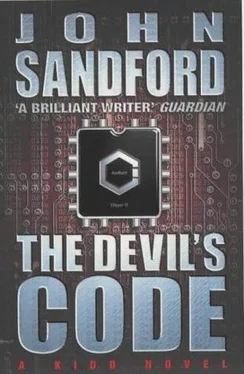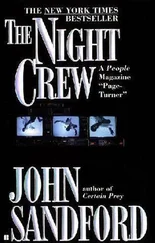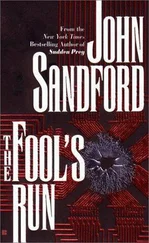I dropped LuEllen on the corner where we crossed the fence, and she was gone in an instant. I took the car around the block, parked, and crossed the fence myself five minutes later. LuEllen was waiting. We'd wrapped all of her tools in towels, and we were decently quiet as we moved slowly through the trees toward Corbeil's apartment. Halfway there, we stopped for a radio check with Green:
"Got us?"
"Gotcha."
We started moving again. There's a technique to the movementhunters call it "still hunting," and it takes some discipline. LuEllen and I learned it, separately, as a method of staying out of jail. You take three slow steps and stop, and listen. Then five more, and stop. You cover ground more quickly than you'd think, and quietly, and almost always hear other people before they hear you.
We took fifteen minutes crossing to Corbeil's, and it was all worth it, for our own self-confidence. If we were caught with LuEllen's black bag, there'd be no point in explanations.
At the edge of the golf course, we stopped under cover of a low twisted pine, and listened. In twenty minutes, we heard nothing, nor did we see anything move. Corbeil's apartment was dark, except for the IR glow through the night glasses.
"Gonna do it," I said.
"Got the reel."
She had an old Penn level-wind reel filled with fishing line. We'd attached a piece of a black 3.5-inch computer floppy disk to the end of the line, as though we were going to cast it.
What I was going to do was easy enough, but I would be out in the open: a risk. After checking around one last time, I stepped out of the landscape planting and walked up to the garage door, towing the line behind me.
Six inches from the garage door, a small electric eye looked across at its illuminator on the other side of the driveway. I taped the floppy to the edge of the metal case around the illuminator, so it was hinged, and could fall up or down. Then I walked along the side of the building into the back, as though I were heading for the golf course. A minute later, I sprawled out next to LuEllen.
Normally, a driver would pull up to the door inside the garage, and tap his radio-operated garage-door opener to send the door up. Electric eyes both inside and outside the door would make sure that the door would not come down on top of the car, should it stop for some reason. As long as the electric eye's illuminator was blocked, the door would stay up. The normal up-and-down cycle would not give us enough time to get inside, without taking the risk of being seen by driver of the departing car. With the electric-eye blocked, however, the door would simply stay up until we cleared it.
We couldn't just cover the eye, though, because if a car came from the outside, and the eye was blocked, the door wouldn't come back downand whoever had just driven into the garage would probably notice that. So we needed the hinged cover.
All of that was easy enough: we'd both done something like it in the past. But the wait was a killer. During the week, when we were scouting the place, a car might come out or go in every fifteen minutes or so. The longest we'd had to wait was a half hour. This time, we had to wait for forty-five minutes, but we lucked out. When the door finally went up, the car was inside the garage, heading out.
I put the radio to my mouth, and said, "Up yours." Green came back: "Sounds good to me."
I pulled the straps for LuEllen's black bag over my back, and got to my knees. The brown Town Car cleared the garage and started around the approach drive, the door still up. As it began to exit, LuEllen pushed the speed-dial button on her cell phone. When the car disappeared, LuEllen whispered, "Go."
We went. As we crossed the drive, she said into the phone, "George? Is this George?" Then, "Don't tell me this is a wrong number, buster."
The guard at the reception center, on the other end, eventually hung up, but by that time we'd walked thirty feet across the garage and were sheltered behind a concrete pillar at the freight elevator. The elevator doors were shut, but opened when we pushed the call button. A roof light came on, and I reached up and covered it with the black bag until LuEllen got the doors closed.
"Hatch," she whispered.
I made a hand stirrup, as I had for Lane back in Jack's house, and LuEllen stood up in it and pushed the elevator hatch askew. LuEllen peered up the elevator shaft with the night glasses. Looking for an infrared motion detector or anything else that might trip us up.
"We're clear," she whispered, and pushed the hatch up out of the way. I boosted her through, handed her the bag, and followed behind. Using the light of two needle-flashes, we put our Jumar climbers on the cable, replaced the hatch, and started up in the dark.
A five-minute climb, eight floors. Hanging off the elevator door at Corbeil's floor, LuEllen first took the stethoscope out of her pocket, and listened. Nothing. Then she dialed the next number on her speed dialCorbeil's apartment. Again, no answer. She patted me on the shoulder. I had her mechanical door-openers ready. I forced the jaws between the doors, and we pried the doors open LuEllen did a quick peek with a mirror, then clambered into the hallway. I was five seconds behind her, with the bag.
The hallway was arranged like many rich people's hallwaysso that the rich people would encounter each other as seldom as possible. A vestibule at the main elevator branched into two hallways, one for Corbeil's apartment, one for the other apartment that shared this entry floor.
Both hallways made a sharp turn just off the vestibule. When we crawled out of the service elevator shaft, we were already on Corbeil's side of the floor, but too far down the hall, past his door
We went back to his door and LuEllen took the jaws from me and forced them between the door and the steel doorjamb. Then she attached a steel wheel, like a small steering wheel, to a square screw-end at the top of the jaws, and moved behind me so I could turn it. The mechanical advantage was huge, the big wheel must have spun five or six times for every quarter-inch that the jaws opened, but nothing could stand against them. Slowly, slowly, the door moved; then suddenly, popped.
LuEllen had moved around so that she was below me, facing the door, a heavy utility knife in her hand. When the door popped, she shot inside, making for the closet where we thought the alarm console was fixed. As she did that, I began uncoiling 150 feet of climber's rope from the black bag.
As I did it, I was counting to myself. Some of the alarm systems give you as much as two minutes to punch your code into the key pad. Some of them give you less. As soon as she'd gone into the apartment, the keypad began a slow beeping. Then she was into the closet. I stepped in behind her and pushed the door shut.
Twenty seconds. I could hear a scuffling sound, a ripping sound, then quiet, except for the beep-beep-beep-beep and then beeeeeeeeeeeeee. Thirty seconds. The pad was dialing out. Damnit. The shortest possible delay LuEllen appeared in the doorway, black-on-gray "We're good," she said, in an almost normal voice
"I'll rig the line," I said. I was drenched with sweat. I did industrial espionage, and went places where I wasn't wanted, but the big-time apartment break-in wasn't my style.
"Look at the rug," she said.
I looked down, in the light of her flashwe were leaving greasy tracks behind us. "Uh-oh." I stepped to the door and looked out in the hall. The tracks came all the way down the hall from the elevator, though they were harder to see in the subdued hall lighting. "Let's get the line rigged. We'll just have to take a chance that nobody'll see them."
Another unforeseen risk
We did a quick run through the apartment to make sure it was empty. On the way, I stopped for a few seconds to admire LuEllen's work with the alarm. She'd used the knife to cut a hole through the drywall to expose the alarm consolecouldn't just pull the wires out, because if you cut a wire, the security service would be automatically alerted. She'd then stripped the wire, clipped in bypasses, and then cut the wire between the two bypasses The top bypass silenced the keypad, the bottom one would keep the circuit alive, so the cut-wire call-out would never be made. She'd done it in about twenty-five seconds.
Читать дальше












